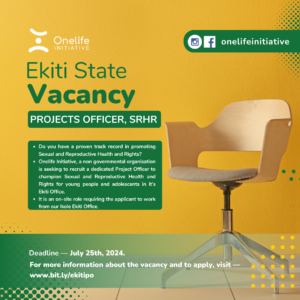Sensitization Workshop with Ogbomoso Maize Agri-Business Cluster Actors
One Life Initiative for Human Development on Saturday, July 12th, 2014 organized a livewire cutting edge sensitization workshop for maize agri-business cluster actors on the IFDC/2SCALE Project to develop maize value chains. The workshop held at the main hall of the Ogbomoso Ise Oluwa ni Cooperative building and lasted approximately 4 lively hours (10.30 am -2.15 pm). It was a time of maximum exchange of ideas and awareness on cutting edge information for various actors related to the maize value chain which included 31 representatives inclusive of maize farmers belonging to the cooperative, agro-based input suppliers, processors and microfinance banks representatives. The workshop though convened by OneLife Initiative is part of the IFDC/2SCALE Project.
Groundbreaking moments on the workshop came as Prince Gabriel Akinpelu, the Union’s Manager and ‘Sola Fagorusi, OneLife’s Programmes Manager highlighted the scope, components, activities and intentions of the project. The project participants and partners also introduced one another.

A concise presentation on Local Maize Agronomy by the former cooperative manager, Mr. Adisa Simeon pointed out local planting cycles for maize, the common land preparation methods used as well as the typical types and amount of input ( e.g. pesticides, herbicides and fertilizers) used by farmers in the Ogbomoso area. Following this, Akin Olatidoye, OneLife’s contact on an IITA private sector initiative; AgResults facilitated a session on Improved Maize Agronomy. Akin presentation’s revolved around a discussion of dimensions and critical gaps to fill in improved maize agronomy practices to increase productivity. The session was fully interactive as the presentation slides were Bilingual (English and Yoruba) and maize farmer actors made valuable contributions and clarifications around the subject of maize agronomy practices.
A stirring session on Aflatoxin, Farmer’s Health and Occupational safety for maize value chain actors followed. It was facilitated by Dr Adenekan Osiyemi, a medical practitioner with the Geriatrics Department, University College Hospital Ibadan. Dr. Osiyemi’s presentation centered on Occupational Health Risks in the maize value chain, primarily risk factors of aflatoxin contamination which is endemic in the maize value chain were highlighted. The symptoms, mode of infection, contamination risks and health dangers of aflatoxin infection and contamination on the maize value chain were unraveled to the participants at the workshop. The Presentation by the medical practitioner generated a buzz of questions and feedbacks which were themed around: access of health services checks following the highlighted symptoms, food safety and regulation. A follow-up session on Improving Production Quality by Reducing Aflatoxin Contamination in Maize came sequel. Olatidoye did a general step down of technical information adapted from IITA AgResults on pathways and practices to reduce Aflatoxin contamination. The stress during this session was on which best maize agronomy practices and input (e.g. improved maize variety and biological control products like IITA’s Aflasafe) created the most effective approach to eliminating aflatoxin contamination and risk. Aflasafe was also passed round the training venue for all to see.

High-information ended sessions on input dynamics for Maize agronomy and production followed. The first of these sessions was facilitated by an input supplier from Irorun Agbe Booster. He highlighted several relevant knowledge based factors and considerations needed to make right choices at some farm-based input end for effective production results. The other session was facilitated by Mr. Adeogun, L.O from Caretaker Microfinance Bank, Ogbomoso. He gave a succinct and lively appraisal of funding mechanisms for maize farming and production, its dynamics, challenges as well as some advice on accessing finance for maize agribusiness. The presentation on microfinance equally generated heated feedback from participating maize farmers. Such feedback included concerns about bottlenecks and high demands placed in the way of accessing finance input as well as the erection of barriers or in some cases exclusion from valuable financing by some institutions. A brief presentation on the components of AgriBusiness followed.
The workshop was wrapped off by relevant project briefings on the proposed demonstration plot and the continued partnership between OneLife who is currently providing Business Support Services forOgbomoso Ise Oluwa Ni Farmer’s Multipurpose Cooperative Union Limited and IFDC/2Scale. As a follow up to the discussions held, OneLife Initiative has already sourced a 20 tonnes market from a marketing firm following earlier discussions that production by farmers should be demand-driven.


